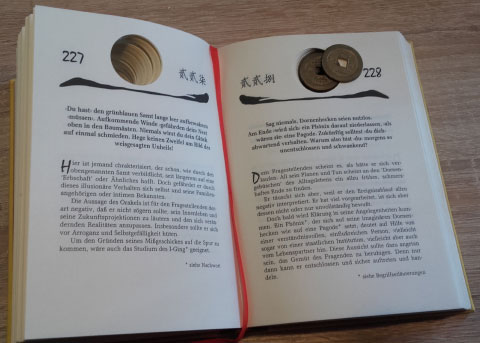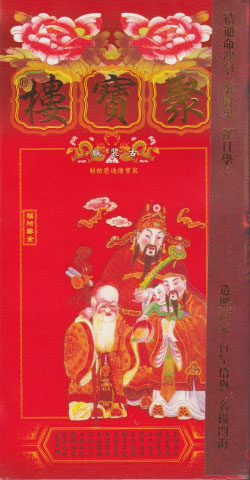I Ching, Yijing or Zhou Yi
"Oracle of the moon": © 2000 LiSe
 Yi Jing, Oracle of the Moon
Yi Jing, Oracle of the Moon


神數
“Shén Shù”,
the Spirit Numbers of Zhuge Liang

The German translation by Stefan Kappstein, with 10 coins numbered 0 to 9
Other names:
孔明 神數 Kong Ming shenshu
諸葛亮 神數
Zhuge Liang
shenshu
It is a beautiful oracle, consisting of 384 verses. On the website of Steve Marshall (or Biroco) is a review by Steve Moore.
Zhuge Liang (181 – 234), courtesy name Kongming, was a chancellor (or prime minister) of the state of Shu Han during the Three Kingdoms period. He is recognised as the most accomplished strategist of his era, and has been compared to Sun Tzu, the author of The Art of War. If he actually made the Shen Shu is not certain. The Tongshu or Tung Shing, a yearly almanac, appears to be the Shenshu’s natural home.
Tai Yi Shen Shu 太乙神數 is one of the three 三式 predictive arts from China, the others being Da Liu Ren and Qi Men Dun Jia. These arts are involved in divination and astrology. The San Shi or Three Styles 三式 are considered China's highest metaphysical arts.
In general, Da Liu Ren is considered the highest of the three arts. Da Liu Ren was used extensively from the time of the Song Dynasty until the late Qing. Tai Yi Shen Shu is used to predict macroscopic events like wars or the meaning of supernovae. One form of Tai Yi Shen Shu has been popularized over the centuries to predict personal fortunes.
The Shenshu oracle has nothing to do with acupuncture or pressure points.
"Das Orakel der Heiligen Zahlen" by Stefan Kappstein. Publisher Ryvellus Medienverlag, ISBN 3-89453-065-0. It is a beautiful small book, with coins inside, 17 x 12 x 3.5 cm.
There is a Dutch translation from the German one.
"The Magical Lots of Zhuge Liang" by Yujing He and Justin McNulty.
In my translation I avoided the - in my eyes - fanciful but improbable ideas of the German one, and rather chose the more obvious translations of characters. I did add names to the verses, the original has none.
English is not my native language, so you will encounter words and sentences which are weird. I appreciate any corrections, please tell me!
It seems many verses have rhyme. It gets lost in translation. There are several verses which are identical with verses in the LingQiJing, especially towards the end.
The way of consulting consisted of counting the strokes of three characters, often a name. Kappstein changed it into casting numbered coins. Put the coins, numbered from 0 to 9, in a bag or other container, and grab one. Write down the number. Put it back. Repeat this twice. Now you have a 3-digit number. If it is higher than 384, subtract 384. If it is still higer, subtract again 384, and so on. Or use Emanuele's excellent casting tool.
Now you have a nuber between 1 and 384. Find the verse in the table below.
Shu means number, but also fate. When the gods or spirits 'count' you, you might be close to a dire fate. Oracles are a means to pinpoint your fate and avert it or change it for the better.
I tried to find a correlation with the YiJing (I Ching). The first two verses of the ShenShu start with the first two hexagrams of the Yijing, Heaven and Earth (Harmen, thanks for finding this.) Someone added a hexagram line to each verse, but the correlation bewteen the two seems very meagre.
The age of the Shenshu is not clear at all. One of the commentaries dates from the first revolution (see review by Steve Moore), but it seems the verses themselves are older. I tried to find indications about its age.
